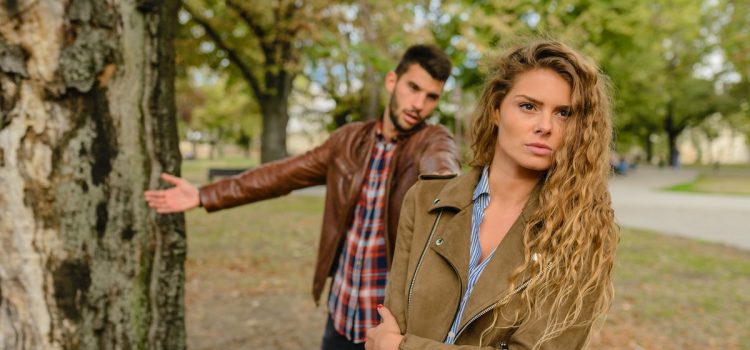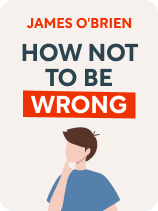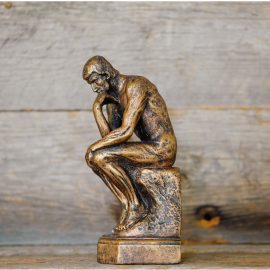

This article is an excerpt from the Shortform book guide to "How Not To Be Wrong" by James O'Brien. Shortform has the world's best summaries and analyses of books you should be reading.
Like this article? Sign up for a free trial here.
Why do hurt people, hurt people? Can hurtful people change course by healing their own pain?
James O’Brien would have counted himself among the “hurt people hurting people.” He started his own journey by exploring his childhood trauma in therapy. O’Brien claims that only by getting to the root of our pain can we learn to have empathy for others.
Keep reading to learn O’Brien’s story of awareness and healing.
Why Do Hurt People Hurt People?
Why do hurt people, hurt people? O’Brien claims that most of our prejudices and negative attitudes toward other people stem from our denial of pain we experienced in childhood. In other words, as the saying goes, “hurt people, hurt people.” Specifically, says O’Brien, boys who are taught to deal with painful experiences by “manning up” frequently become men who believe they can fight their way out of any problem, often by attacking others. As O’Brien acknowledges, he became well known as a radio host for “schooling” his guests—using verbal aggression to win arguments at any cost.
O’Brien was in his forties when he began questioning some of the beliefs he’d held for years. He didn’t do so spontaneously; in fact, as is often the case, his self-examination was prompted by a personal crisis. He started to realize that his long-standing belief that pain makes you tough and you can fight your way out of any problem was not only wrong, but it was also making him and his family unhappy.
For much of his life, O’Brien was the guy who always had to be right and could never back down from arguing his position. He was afraid that being wrong would make him weak or vulnerable. It got so bad that winning became even more important to him than being right. His professional career as a radio broadcaster was based on this approach and simultaneously fed into it: In his line of work, he says, the better you are at taking down others and reinforcing prejudice, the more successful you are.
Then someone O’Brien loved dearly (whom he doesn’t name) became very ill, and he found that all of his former tactics not only didn’t work, but they also caused damage. He tried to argue this person out of being sick and encouraged them to be tougher and “fight” harder against a serious illness that was defying medication and treatment. This approach didn’t work, and it was harmful to his family. He felt he was failing to be the man he wanted to be. O’Brien was desperate to change, so he started therapy.
Therapy helped O’Brien realize that negative experiences in his childhood shaped who he was as an adult. He began to see that he was living in an almost permanent “fight or flight” state of hyperarousal, which caused him to think he could fight his way out of any problem. While this approach had helped make him professionally successful, it had also made him unhappy—and it was damaging his relationships.
O’Brien discovered when he started therapy in his mid-forties that he’d spent his whole life being wrong about who he was. The fear and tension that he’d thought were a part of his identity were actually scars—and they could heal.
Therapy taught O’Brien that negative experiences in childhood cause adult problems, so, in order to solve his problems, he had to acknowledge those early experiences. He had to recognize and accept that other people had hurt him.
O’Brien’s Childhood
O’Brien, who was adopted, was sent to an all-boys boarding school, where the headmaster regularly beat him for years. O’Brien always defended the practice by saying that he turned out OK. He didn’t believe he was harmed by it. In fact, he frequently bragged about the beatings, treating the experience as a badge of honor that demonstrated his toughness. The truth is that O’Brien was in denial about how much pain and humiliation the beatings had caused him. In response, he developed what he calls a “survival personality” to protect himself, and it became the basis for his success. In the process, however, he abandoned his true self.
O’Brien explains that, in the past, British public schools taught boys to face punishments and negative experiences in general by “toughening up” or “manning up.” Beatings were commonly used to punish students for even minor infractions. Many of these students went on to become very successful in public life, but O’Brien contends that they were unaware of their inner pain and became incapable of feeling empathy for other people’s pain.
(Shortform note: “Public” schools in England and Wales are actually “private” in the American sense, in that they charge tuition and are often associated with the upper class. Historically (and in some cases to this day), British public schools only admitted boys, who frequently went on to hold positions in the British government. Public schools were long seen as places that prepared men to “run the Empire.”)
O’Brien’s father also spanked him as a means of formal punishment, a practice that O’Brien says was still socially sanctioned in the 1980s when he was growing up. O’Brien makes it clear that he loved his father, who rarely acted in anger, and that he doesn’t think those spankings caused him harm in the same way as the school beatings. However, he has come to believe that all corporal punishment of children is wrong.
Coming to Terms With Negative Childhood Experiences
The turning point: O’Brien’s views first began to shift when he was a contributor on a TV show and was defending the practice of spanking children. A participant asked him whether he would hit his wife if she disobeyed him. He realized that as a question of basic humanity, it’s never acceptable to physically harm another person to discipline or punish them, regardless of their age.
The corporal punishment inflicted on O’Brien in childhood primed him to constantly be on the alert for attack, so, as an adult, even small issues caused him to overreact. Aggression became a way of life. He extrapolates from his own experiences that our early, unconscious defense mechanisms can become our entire personality and way of relating to the world.
O’Brien has recognized this same dysfunction in other people: On his radio show, O’Brien spoke with callers who had also developed coping mechanisms to survive childhood adversity. For example, a former gang member called in to his show and explained how as a 16-year-old, he had to get past a gang just to leave his flat. If you weren’t in the gang you got beatings every day, he said, so it was easier to join them. He adapted in order to survive, but, as an adult trying to hold down a regular job, those adaptations weren’t working for him. He was struggling to stay away from the criminal life that he knew so well. Like O’Brien, this caller had developed armor to protect himself from the circumstances of his childhood, but as an adult, it was becoming harder to move through the world with so much armor on.
O’Brien believes that much of public debate today is between people who have built up so much armor to protect themselves from past pain that they are essentially showing the world a false persona. It’s difficult for people to truly listen to each other and learn more about controversial issues when they aren’t even showing up as their authentic selves. By examining our negative childhood experiences, we can learn to change our minds and bridge the gap between opposing viewpoints.
Roadblocks to change: Acknowledging some of the negative experiences in his childhood was difficult for O’Brien because it sometimes felt like a criticism of his parents. For example, he had to deal with his feelings of abandonment at being given up for adoption by his birth mother and sent off to boarding school by his adoptive parents.
In addition, because O’Brien came from a comfortable, middle-class family and was loved by his parents, he often told himself that things could have been much worse. But he learned in therapy that this, too, was a type of armor designed to protect him from having to look inward and examine his own pain.
(Shortform note: While definitions of trauma vary, psychologists generally acknowledge that trauma is best understood as a constellation of symptoms, rather than as a specific type of negative event. Consequently, acknowledging childhood trauma doesn’t have to mean placing blame on those who inflicted it or believing the specific events you endured were the equivalent of war or natural disaster. Instead, it means examining your own response to distressing or disturbing events.)
Conclusion: We Must Acknowledge Our Own Pain to Empathize With Other People
In considering everything he had been wrong about, O’Brien wonders whether the source of his wrongness on less important issues was the same as the source of his wrongness on significant issues. He concludes that the source is the same: childhood trauma.
There are degrees of trauma—O’Brien’s boarding school experiences are not the same as the former gang member’s experience in a criminal gang, for example—and trauma affects people in different ways, but the common denominator, claims O’Brien, is that if you don’t like the person it’s made you into, you can change. It’s treatable.
O’Brien says that our lack of empathy and negative attitudes about other people almost always stem from our denial of our own pain. As long as we fail to address the negative experiences that made us who we are, it will be hard for us to understand the perspectives of others. However, if we can recognize our own hurt, we can let down our guard and be more vulnerable, which allows us to relate to others by listening and establishing trust, rather than by arguing.
And by listening and learning, we can change our mind.
| Is Childhood Trauma Really the Cause of Prejudice? Some might argue that in claiming his childhood trauma caused his prejudices and failure to recognize racism, O’Brien is trying to let himself off the hook. Does childhood trauma really cause prejudice? The causes of prejudice are multiple and complex and include social, cultural, and historical factors. For example, prejudice is often taught through socialization. A family or societal history of intolerance can have a huge effect on an individual’s tendency to form prejudices. By the age of five, children already have the ability to place people into social categories, and US and British studies show that ethnicity is the most influential factor in forming such categories, with gender the second most influential. A psychological explanation for prejudice is more in line with O’Brien’s experience. Research demonstrates that people with authoritarian personalities are predisposed to becoming prejudiced. Authoritarians typically have rigid beliefs, do not tolerate weakness in themselves or others, believe in a strict system of punishments, and are highly respectful of authority, to name just a few of their traits. An authoritarian personality can be the result of one’s environment—without diagnosing O’Brien as “authoritarian,” it is easy to see how a boarding school environment that emphasizes toughness and doles out frequent punishments for rule violations could breed the type of personality that might be rigid and intolerant. Of course, plenty of people who experience childhood trauma do not form strong prejudices or discriminate against others. Indeed, for many children, the trauma they experience is discrimination itself. Chronic exposure to discrimination can trigger racial trauma. |

———End of Preview———
Like what you just read? Read the rest of the world's best book summary and analysis of James O'Brien's "How Not To Be Wrong" at Shortform.
Here's what you'll find in our full How Not To Be Wrong summary:
- Why learning to change your mind is a valuable skill
- How to combat prejudice and gain empathy for others
- Why you should take a step back and reexamine your beliefs






